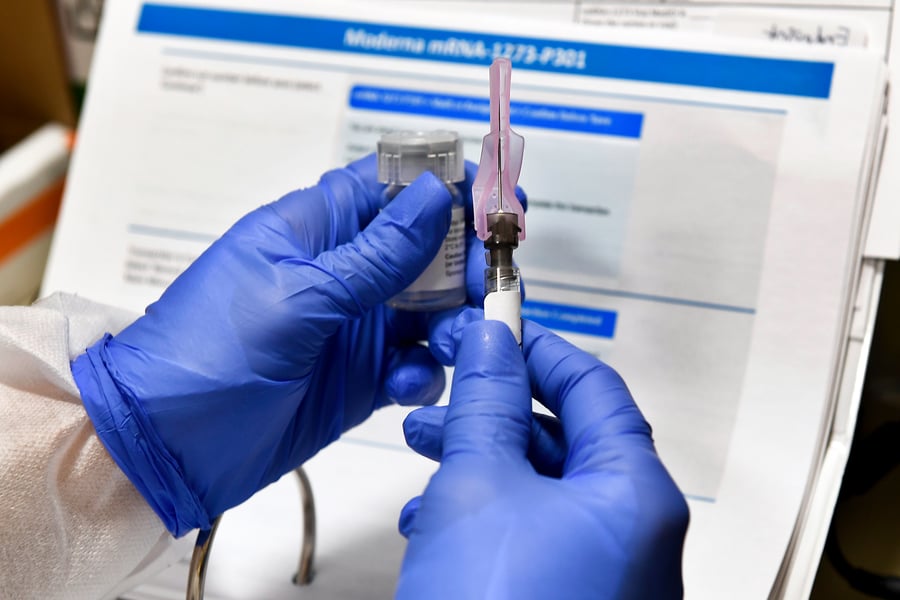UPDATE (11/30): Moderna will submit its Covid-19 vaccine to the Food and Drug Administration for emergency use authorization after the biotech firm completed its Phase 3 trial, NBC News report. The study found that the vaccine was 94.1% effective at preventing Covid-19, and 100% effective at preventing severe cases (along with the drug needing FDA approval, the study itself still needs to be peer-reviewed). The FDA’s Vaccines and Related Biological Products Advisory Committee will meet and discuss the Moderna vaccine December 17th, one week after it discusses another promising vaccine developed by Pfizer and BioNTech.
**
A potential Covid-19 vaccine created by the biotech company Moderna was nearly 95% effective in preventing the illness, according to the results of a preliminary trial, The Washington Post reports.
The news arrives one week after drugmaker Pfizer announced that its vaccine was over 90% effective in patients with no previous exposure to Covid-19. While neither the Pfizer nor Moderna trials have been peer-reviewed, the initial findings suggest the United States could be on track to have two vaccines available for some by the end of 2020.
Moderna developed its vaccine in conjunction with the National Institute of Allergy and Infectious Diseases. It was part of the federal government’s Operation Warp Speed initiative and the company received $2.5 billion in federal funding for research, development, and manufacturing.
Dr. Anthony Fauci, who heads the Institute of Allergy and Infectious Diseases, said of the Moderna results: “It’s extremely good news. If you look at the data, the numbers speak for themselves. I describe myself as a realist, but I’m fundamentally a cautious optimist. I felt we’d likely get something less than this… I said certainly a 90-plus-percent effective vaccine is possible, but I wasn’t counting on it.”
The Moderna vaccine was tested in 30,000 people, half of whom received two doses of the vaccine, while the other half received a placebo. Of the 95 cases of Covid-19 that have appeared among people in the study, 90 were in the group that received the placebo. Even more significant, the 11 severe cases of Covid-19 that occurred in the trial were all among those who received the placebo.
“In this pandemic, what has been awful from a public health standpoint, an economic standpoint, is the worry people have to get so sick they have to go to the hospital — so sick they have to get to the ICU and have a high risk of dying,” Moderna’s CEO Stéphane Bancel said. “If a [vaccine] could prevent 95% of people to not get [the] disease, but to not get [the] severe disease, that would be a game-changer: the impact on hospitals, the impact on people’s psyche and the impact on deaths.”
One key distinction between Moderna’s vaccine and Pfizer’s is that the latter needs to be stored in extremely cold conditions — which isn’t always possible in typical vaccine settings — while the former can remain stable in a refrigerator for a month, and frozen for up to six months. It also doesn’t require dilution at the point of care, like Pfizer’s vaccine.
Moderna said it would be able to produce 20 million doses of its vaccine by the end of the year (it is a two-dose vaccine, so that would be enough for 10 million people), and at least 500 million doses next year. Still, Moderna said it would finish its trial before applying for emergency use authorization, meaning it still needs to wait until there are 151 cases of Covid-19 among study patients (that will likely happen soon, however, due to the current spike in cases nationwide). The Food and Drug Administration also still needs to review Moderna’s study and approve its vaccine (same with Pfizer’s), but it’s possible both vaccines will be available for high-risk populations by the end of the year.
From Rolling Stone US






































